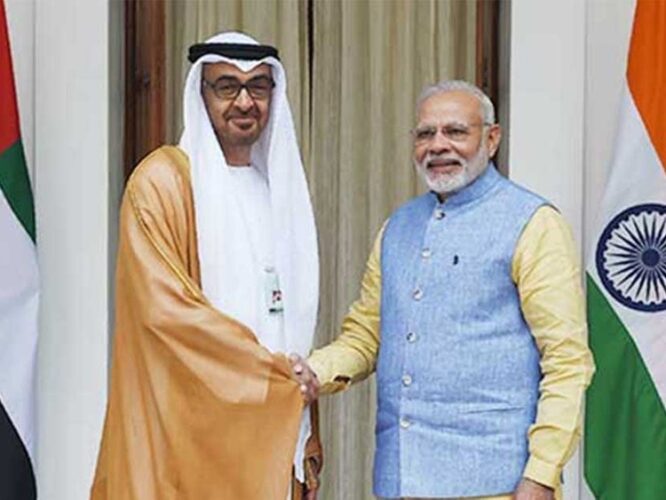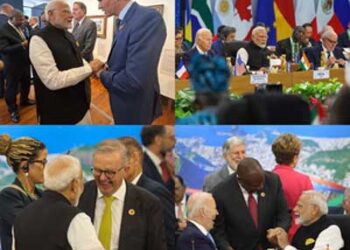The Indian government has approved the proposal to sign an MoU between India and the United Arab Emirates (UAE) on industrial and advanced technology cooperation.
Growing India-UAE economic and commercial relations contribute to the stability and strength of the two countries’ rapidly diversifying and deepening bilateral relationship. Bilateral trade between India and the UAE has increased from $180 million (Rs 1,373 crore) per year in the 1970s to $60 billion (Rs.4.57 lakh crore) in 2019-20, making the UAE India’s third largest trading partner after China and the US.
Furthermore, the UAE is India’s second largest export destination (after the United States), with an export value of $29 billion (Rs 2.21 lakh crore) for 2019-2020. With an estimated investment of $18 billion, the UAE is India’s eighth largest investor (Rs 1.37 lakh crore). The value of Indian investments in the UAE is estimated to be around $85 billion (Rs 6.48 lakh crore).
India and the United Arab Emirates (UAE) have long-standing friendships based on shared cultural, religious, and economic interests.
On February 18, 2022, the two signed a bilateral “Comprehensive Economic Partnership Agreement” (CEPA). This agreement has the potential to increase India-UAE trade from $60 billion (Rs 4.57 lakh crore) to $100 billion (Rs 7.63 lakh crore)
Furthermore, the UAE is India’s second largest export destination (after the United States), with an export value of $29 billion (Rs 2.21 lakh crore) for 2019-2020. With an estimated investment of $18 billion, the UAE is India’s eighth largest investor (Rs 1.37 lakh crore). The value of Indian investments in the UAE is estimated to be around $85 billion (Rs 6.48 lakh crore).
India and the United Arab Emirates (UAE) have long-standing friendships based on shared cultural, religious, and economic interests.
On February 18, 2022, the two signed a bilateral “Comprehensive Economic Partnership Agreement” (CEPA). This agreement has the potential to increase India-UAE trade from $60 billion (Rs 4.57 lakh crore) to $100 billion (Rs 7.63 lakh crore) in the next five years.
The MoU envisions mutually beneficial cooperation in the following areas: industry supply chain resilience, renewable and energy efficiency, health and life sciences, space systems, artificial intelligence, industry 4.0 enabling technologies and standardisation, metrology, conformity assessment, accreditation, and halal certification.
The MoU also aims to strengthen and develop industries in both countries through investments, technology transfer, and industry deployment of key technologies. This is likely to create jobs throughout the economy.
The implementation of the Memorandum of Understanding may result in an increase in research and innovation in all areas of mutual cooperation, particularly renewable energy, artificial intelligence, industry enabling technologies, and health and life science. This could lead to increased growth in these sectors, increased domestic production, and increased exports and reduction in imports.
India’s exports to the UAE are diverse, with a wide range of products. Petroleum products, precious metals, stones, gems and jewellery, minerals, food items (cereals, sugar, fruits and vegetables, tea, meat, and seafood), textiles (garments, apparel, synthetic fiber, cotton, yarn), engineering and machinery products, and chemicals are major export items to the UAE.
Petroleum and petroleum products, precious metals, stones, gems and jewellery, minerals, chemicals, wood and wood products are India’s major imports from the UAE. In 2019-20, India imported 21.83 MMT ($10,927.52 million) of crude oil from the UAE.
The UAE has the largest expatriate community in the world, with over 2.6 million Indians living there. Professionally qualified personnel make up about 15 to 20% of the community, followed by 20% white-collar nonprofessionals (clerical staff, shop assistants, salesmen, accountants, and others), and the remaining 65% are blue-collar workers.
There is a sizable Indian business community here. The Indian community has played a significant role in the UAE’s economic development.
The UAE’s investment in India is estimated to be around $17-18 billion, with FDI accounting for $11.67 billion and portfolio investment accounting for the remainder. In terms of FDI, the UAE is India’s ninth largest investor.The UAE sovereign wealth funds invested over $4.12 billion in India during FY 2020-21.
The UAE invests primarily in five sectors in India: services (15.78%), sea transport (8.80%), power (8.34%), construction (infrastructure) activities (7.15%), and construction development: townships, housing, built-up infrastructure, and construction-development projects (7.08 per cent).
During Prime Minister Narendra Modi’s visit to the UAE in August 2015, it was decided to establish the UAE-India Infrastructure Investment Fund, with the goal of raising $75 billion to support investment in India’s plans for rapid expansion of next-generation infrastructure, particularly railways, ports, roads, airports, and industrial corridors and parks.
During the successive high-level visits, the leaders of both countries reviewed progress toward achieving the UAE’s investment target in India.
Source:OCN








 Finance
Finance






